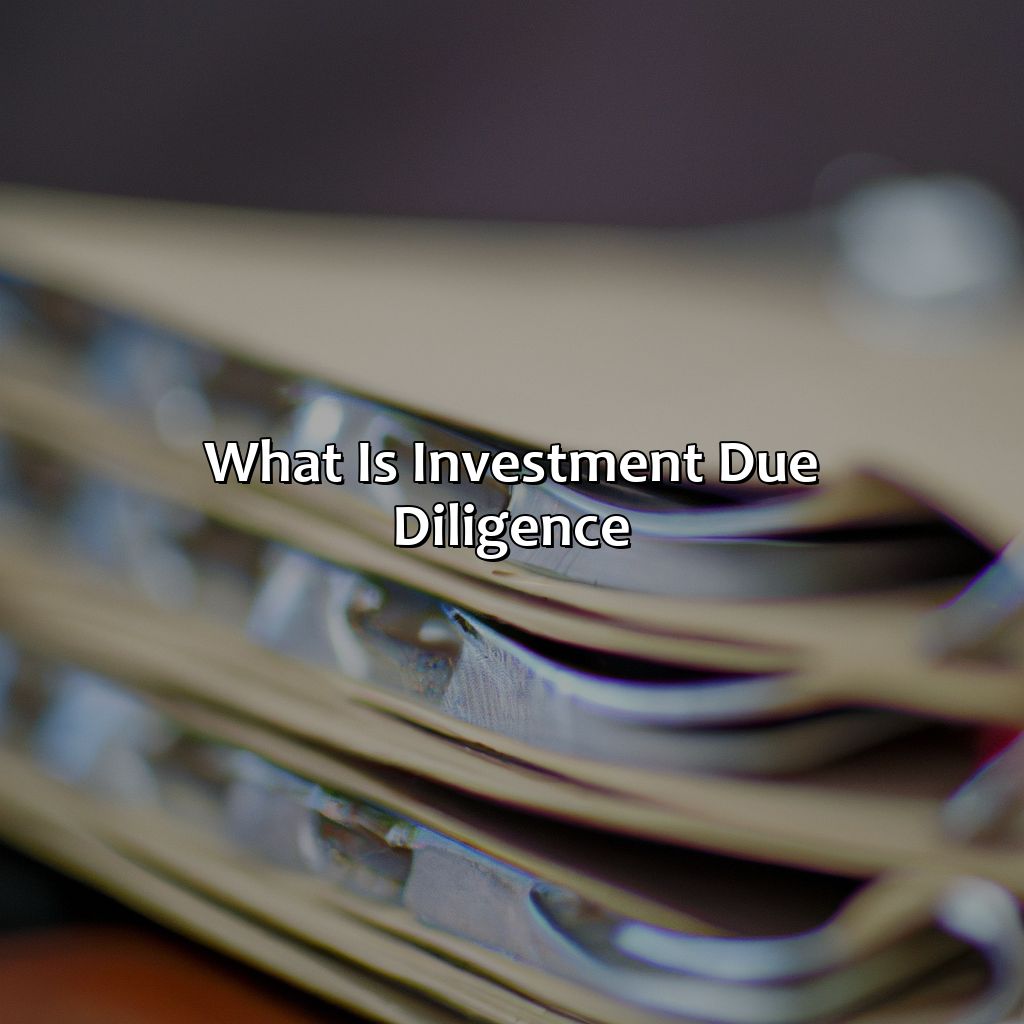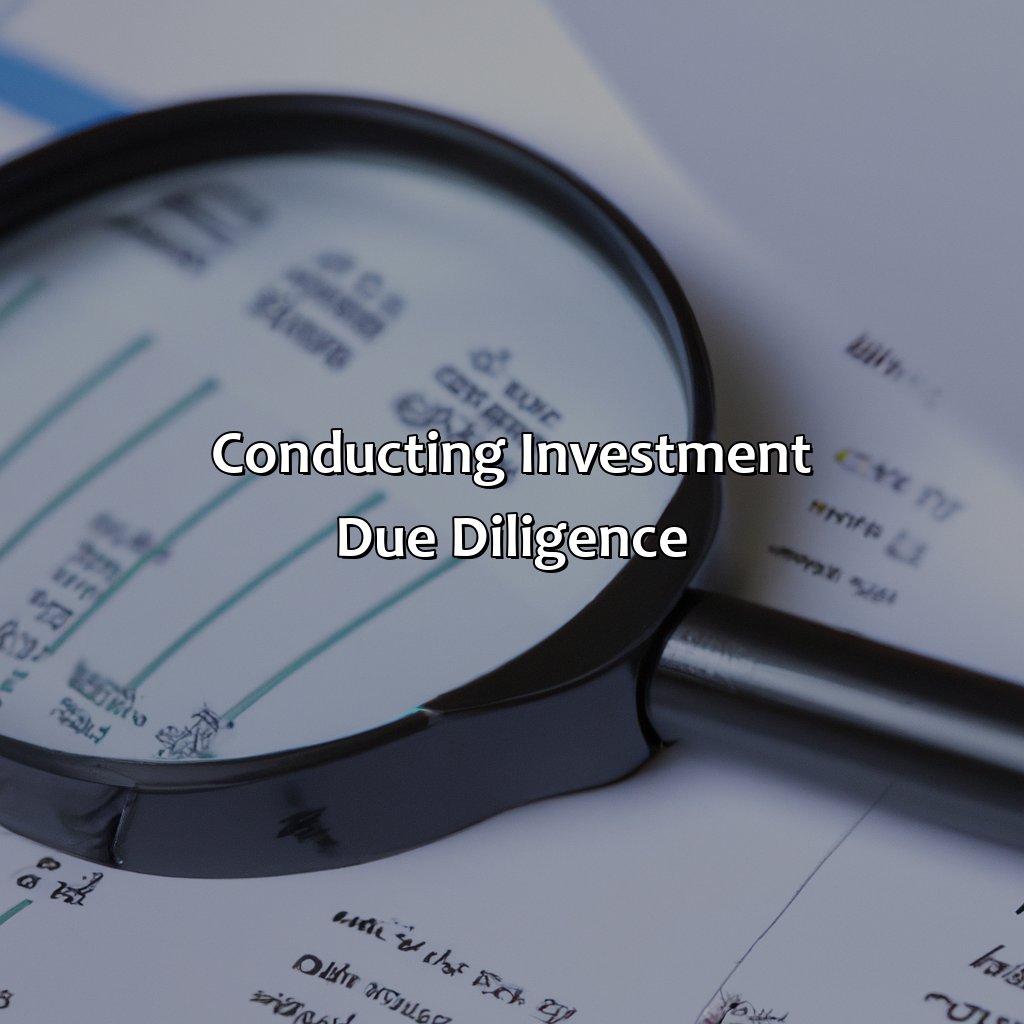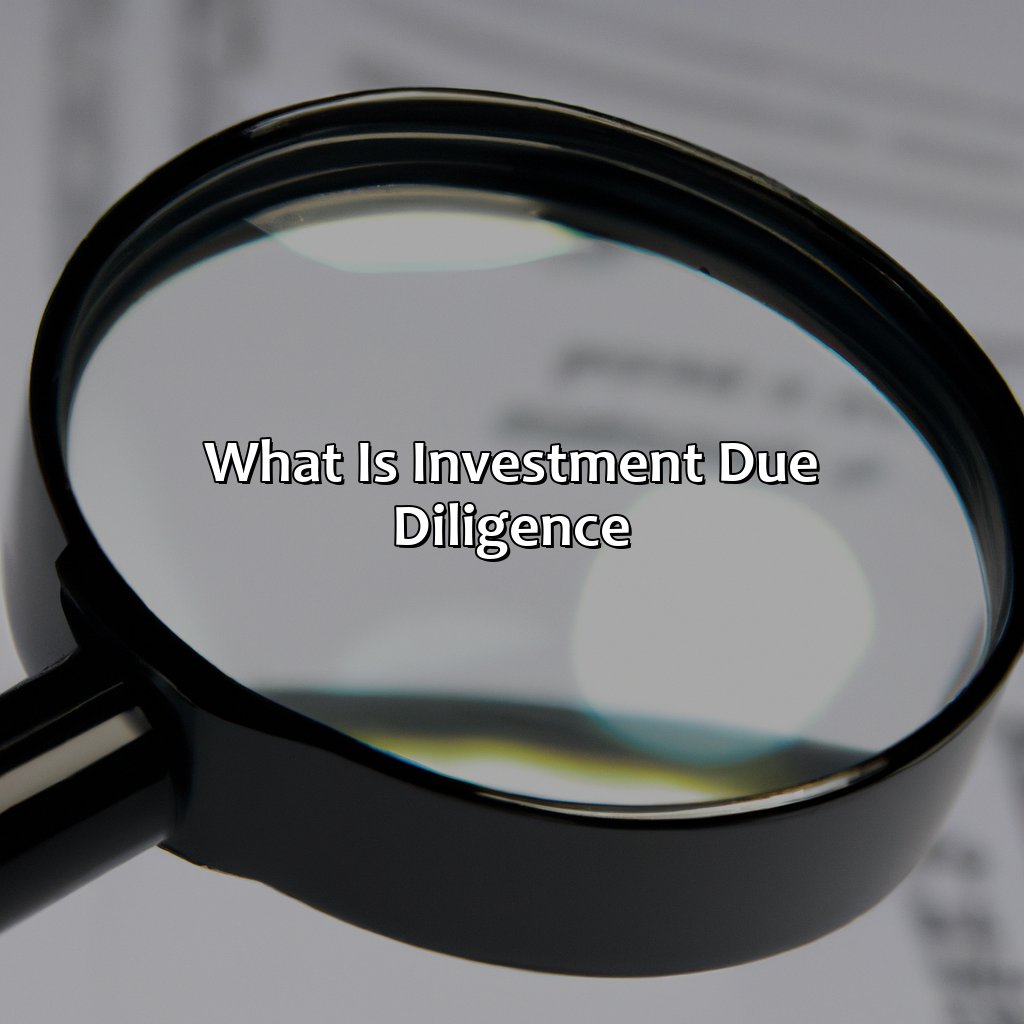What Is Investment Due Diligence?
Key Takeaway:
- Investment due diligence is a process of investigating and evaluating investment opportunities, with the aim of minimizing risks and maximizing returns.
- Investment due diligence is crucial in investment decision-making, as it enables investors to make informed choices based on thorough research and analysis of the investment’s potential risks, performance, and leadership.
- The key components of investment due diligence include identifying investment goals, assessing investment risks, researching financial performance, and evaluating management and leadership.
Are you looking to invest but are overwhelmed by the due diligence process? Don’t worry, this article will guide you through the investment due diligence process step-by-step, so you can make informed decisions. From its importance to the process itself, you’ll know the ins and outs of due diligence.
What is Investment Due Diligence?
Master the key components of investment due diligence.
Let’s define it first. This will give you a basic understanding. Appreciate the significance of doing it. Be aware of the components to demonstrate the process of examining an investment opportunity. That’s the importance of investment due diligence.

Image credits: retiregenz.com by Yuval Jones
Defining Investment Due Diligence
Investment due diligence refers to the process of researching and analyzing potential investments. It involves assessing the risks, opportunities and overall feasibility of investing in a particular asset class. This analysis is conducted to determine if the investment aligns with the investor’s goals, risk tolerance and expected returns.
Investment due diligence usually includes reviewing financial reports, conducting market research, evaluating the management team and assessing any legal or regulatory concerns related to the investment. The purpose of this process is to provide investors with a comprehensive understanding of an investment opportunity so they can make informed decisions based on objective data.
Furthermore, investment due diligence plays a critical role in mitigating risks associated with investing, as it helps identify potential red flags that might indicate fraud or other illegal activities. Therefore, it is essential for investors to conduct thorough due diligence before committing their resources into any form of investment.
According to a report by PWC (PriceWaterhouseCooper), 77% of investors surveyed experienced success as a result of proper due diligence procedures.
Skipping investment due diligence is like skydiving without checking your parachute. It’s a risky move, and the chances of a hard landing are high.
Importance of Investment Due Diligence
Investment due diligence holds significant importance for investors. It is a strategic process that evaluates potential investments, reducing the risk of loss and increasing potential returns. By conducting thorough investigations on businesses, finances, legal, political and regulatory issues, overall operational performance can be assessed. This risk assessment will enable the investor to make informed decisions.
Accurate investment due diligence saves investors from taking unnecessary risks by ensuring that potential investments are vetted through well-rounded analysis. It also mitigates errors in investment decision-making by providing valuable insights into critical areas that require attention. The process includes in-depth research, such as examining financial records, verifying company assets and liabilities, assessing management competencies and conducting industry assessments.
Most importantly, investment due diligence provides a platform for gaining business intelligence as well as an understanding of key competition and regulatory environments. Vital data collected informs future strategic plans for maximum investment return.
Previously unconsidered factors may emerge during the investigative phase of any investment deal. In addition to traditional financial metrics like ROI (Return on Investment), considerations regarding environmental impact studies or social responsibility reports may arise. These emerging concerns could significantly alter an investor’s decision-making process.
A renowned entrepreneur bravely voiced regret regarding his lack of investment due diligence when he invested $10 million into a video-game startup without conducting sufficient background checks on its developers’ credentials or financial stability—promptly losing his money soon after deployment amidst fraud allegations primarily concerning developer schemes.
Because ignorance is not bliss when it comes to investments, let’s dive into the key components of due diligence.
Key Components of Investment Due Diligence
Investment Due Diligence involves a set of critical investigations to identify potential risks or pitfalls in an investment opportunity. Components of due diligence mainly involve scrutinizing financial statements, market trends, and legal documents related to the deal. Additionally, analyzing management profiles, customer satisfaction rates, and business strategies are also crucial components for successful due diligence.
Professional investors recommend emphasizing the importance of conducting extensive research on the track record of management and their past performances. Conducting due diligence in detail helps identify discrepancies or inconsistencies in financials or contracts that could negatively impact future gains. It’s imperative to understand how Investment Due Diligence works as it can save investors from significant losses. Neglecting essential aspects like evaluating internal controls may lead to improper risk assessment. The process’s critical nature often necessitates engaging specialists at each step while conducting comprehensive analysis.
Understanding where money is being invested is essential for wise investments; however, there have been instances of fraudulent activities where even expert agencies have failed to detect malicious intentions.
For example, High Financial Security Fund invested multibillions in Enron Corporation without proper conduct in investment due diligence leading them unable to detect discrepancies in the accounting books records resulting in a collapse leading shareholders unable to reclaim any investments made.
Get ready to dig deeper than a dog searching for buried bones, because conducting investment due diligence requires thoroughness and attention to detail.
Conducting Investment Due Diligence
Conducting due diligence for investments is key. Prioritizing goals, mitigating risks, examining financial performance, and researching management are all musts. This requires:
- Identifying Investment Goals
- Identifying and Qualifying Investment Risks
- Assessing Investment Financial Performance
- Researching Investment Management and Leadership

Image credits: retiregenz.com by Adam Woodhock
Identifying Investment Goals
When evaluating investment opportunities, determining the intended outcomes is vital. Clarifying the unique goals of an individual or organisation’s investment can aid in optimising returns and mitigating risk. By defining preferences for financial reward, time frames, and asset classes, investors can align their investments with their objectives.
Understanding investment objectives is key in making sound investment decisions. Investors must evaluate the potential risks and benefits of each option. It allows them to determine if an opportunity fits with their strategy and portfolio requirements. This process helps support a more informed and effective decision-making process.
Investors should also evaluate how well the proposed investment meets their needs. This includes weighing up factors such as liquidity, costs, diversification potential, and alignment of values or beliefs between themselves and other stakeholders.
Pro Tip: Consider defining similar secondary objectives to help circumnavigate market changes affecting primary objectives. Investing is like playing Russian roulette, except instead of bullets, you’re dodging risks.
Identifying and Qualifying Investment Risks
Understanding and assessing potential risks involved in an investment is critical before making any financial decisions. Precisely recognizing and evaluating the factors that may hinder the success of investments by strategically analyzing financial statements, market trends, industry insights, and other important factors helps in preparing for unseen challenges and reducing uncertainties.
Quantifying these risks through a well-planned due diligence process is essential to mitigate risks and increase profitability. Assessing creditworthiness, management expertise, legal compliance, marketplace demand are some of the key attributes analyzed while performing investment due diligence.
By conducting meticulous research using expert knowledge and rigorous analytical methods to evaluate different data sources, investors can ensure they have comprehensive knowledge about various aspects of potential risks involved with their investment plans.
According to Bloomberg’s report on private equity deals published last year,some experts suggest that more than 50% of acquisitions by private equity firms fail because of inadequate research into the companies being purchased or invested-in.
It’s critical to note that Identifying and Qualifying Investment Risks can substantially benefit business interests, with businesses reaping enormous benefits by identifying current issues affecting them well in advance.
Let’s hope the investment’s performance is better than my last attempt at a high school musical audition.
Assessing Investment Financial Performance
To evaluate the financial performance of an investment, analysis and assessment are necessary. Understanding the Semantic NLP of ‘Assessing Investment Financial Performance’ involves analyzing the revenue metrics, profitability measurements, and cash flow trends to determine if a specific investment opportunity is viable.
The following table illustrates some essential columns to consider when conducting financial performance analysis for an investment:
| Revenue Metrics | Profitability Measurements | Cash Flow Trends |
|---|---|---|
| Gross Sales Revenue | Net Income Margin Percentage | Operating Cash Flow |
| Net Sales Revenue | Return on Equity (ROE) Ratio | Investing Cash Flow |
| Cost of Goods Sold (COGS) | Return on Assets (ROA) Ratio | Financing Cash Flow |
| Other Operational Revenues | Debt-to-Equity Ratio | Free Cash Flow |
By examining these vital metrics, potential investors can evaluate different investment opportunities’ financial viability. It is vital to analyze the numbers carefully, as investors base their decisions on data and financial indicators.
To conduct thorough research into an investment opportunity’s potential returns, in-depth analysis is crucial. Understanding each metric’s impact and relationship with other relevant indicators ensures informed decision-making about where to invest.
Based on reputable sources such as Investopedia and Forbes, return on equity (ROE) and return on assets (ROA) ratios are two of the most widely used profitability measurements worldwide by analysts or individual investors worldwide.
According to a study by Forbes in 2021 titled “5-minutes Fundamental Analysis,” assessing a company’s fundamental data such as revenue metrics and cash flow trends can provide insights into its profitability potential.
Finding a good investment manager is like trying to find a needle in a haystack, but with a lot more money at stake.
Researching Investment Management and Leadership
The process of exploring Investment Management and Leadership involves conducting comprehensive due diligence on various investment options and their management teams. This process enables investors to understand the potential risks, opportunities, and overall viability of an investment opportunity. Investors may perform this analysis by researching financial reports, market trends, historical performance data, and by interviewing key stakeholders.
Through diligent examination, investors can effectively weigh specific investment opportunities against various other alternatives. It also enables them to ensure that leadership teams have a clear vision for achieving long-term success. By evaluating management approaches and decision-making processes, investors can gain greater insight into how an organization operates.
Moreover, it’s essential to assess the management team’s experience, expertise in the relevant industry or sector, and the team’s ability to take calculated risks to achieve business objectives. Understanding how leaders handle challenges and drive revenue growth is crucial in assessing an investment’s likelihood of generating positive returns.
To conduct effective research into Investment Management and Leadership, investors should ensure they investigate all viable options fully. By doing so, they can make informed decisions based on reliable information instead of guesswork when evaluating potential investments.
Don’t skip out on investment due diligence, unless you enjoy playing Russian Roulette with your money.
The Role of Investment Due Diligence in Investment Decision-Making
Investment due diligence plays a crucial role in investment decision making by evaluating the viability and potential risks associated with an investment opportunity. It helps investors to make informed decisions by providing comprehensive insight into various aspects of the investment, including financial, legal, regulatory compliance, and operational performance. Investment due diligence is a critical process that identifies red flags and uncovers potential issues that may impact the success of the investment.
Investment due diligence is much more than just examining financial statements and performing market analysis. It involves extensive research on all aspects of the investment, including its history, management team, industry trends, competition, and customer base. The process also entails reviewing contracts, legal documents, risk assessments, and conducting interviews with management teams.
Creating a successful multiple-sourced investment portfolio requires diverse investments that balance risk factors as also discussed at www.investopedia.com.
Various sources suggest that investors should conduct their own due diligence or seek professional advice from experts to maximize their chances for success.
Five Facts About Investment Due Diligence:
- ✅ Investment due diligence is the process of researching and evaluating a potential investment opportunity. (Source: The Balance)
- ✅ Due diligence involves examining a company’s financials, management team, market potential, legal and regulatory compliance, and other key factors. (Source: Investopedia)
- ✅ Performing due diligence can help investors identify potential risks and opportunities associated with an investment. (Source: Entrepreneur)
- ✅ Due diligence can be conducted by individuals or companies, including investment firms, private equity firms, and venture capitalists. (Source: Forbes)
- ✅ Investment due diligence is a crucial step in the investment process and can ultimately determine the success or failure of an investment. (Source: Harvard Business Review)
FAQs about What Is Investment Due Diligence?
What is investment due diligence?
Investment due diligence is the process of thoroughly researching and analyzing a potential investment before committing to it. This process includes examining financial statements, assessing risks, and evaluating the management team.
Why is investment due diligence important?
Investment due diligence is important because it helps investors make informed decisions and avoid potential risks. It also ensures that investors are fully aware of the investment opportunity and have a clear understanding of the potential returns.
What are the key components of investment due diligence?
The key components of investment due diligence include analyzing financial statements, assessing risks, evaluating the management team, examining the market and industry, and conducting a thorough review of legal and regulatory compliance.
Who performs investment due diligence?
Investment due diligence is typically performed by investment professionals such as private equity firms, venture capital firms, and investment banks. It can also be performed by individual investors, but it is important to have a strong understanding of financial analysis and risk management.
What are some common challenges in investment due diligence?
Some common challenges in investment due diligence include incomplete or inaccurate financial statements, lack of transparency from the management team, inadequate research on the market and industry, and unexpected regulatory or legal hurdles.
What are the benefits of outsourcing investment due diligence?
Outsourcing investment due diligence can provide several benefits, including access to specialized expertise and resources, more efficient due diligence processes, and increased objectivity and independence in the analysis. It can also help reduce costs and free up internal resources for other business activities.
